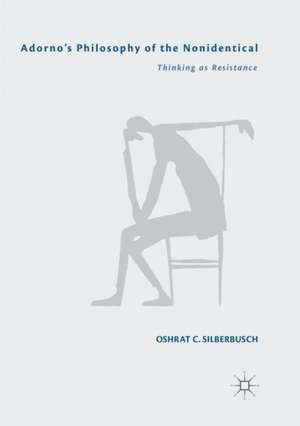Adorno’s Philosophy of the Nonidentical: Thinking as Resistance
Autor Oshrat C. Silberbuschen Limba Engleză Paperback – 20 dec 2018
| Toate formatele și edițiile | Preț | Express |
|---|---|---|
| Paperback (1) | 448.21 lei 6-8 săpt. | |
| Springer International Publishing – 20 dec 2018 | 448.21 lei 6-8 săpt. | |
| Hardback (1) | 527.32 lei 6-8 săpt. | |
| Springer International Publishing – 2 oct 2018 | 527.32 lei 6-8 săpt. |
Preț: 448.21 lei
Nou
Puncte Express: 672
Preț estimativ în valută:
85.78€ • 88.61$ • 71.39£
85.78€ • 88.61$ • 71.39£
Carte tipărită la comandă
Livrare economică 25 martie-08 aprilie
Preluare comenzi: 021 569.72.76
Specificații
ISBN-13: 9783030070748
ISBN-10: 3030070743
Pagini: 205
Ilustrații: XII, 205 p.
Dimensiuni: 148 x 210 mm
Greutate: 0.27 kg
Ediția:Softcover reprint of the original 1st ed. 2018
Editura: Springer International Publishing
Colecția Palgrave Macmillan
Locul publicării:Cham, Switzerland
ISBN-10: 3030070743
Pagini: 205
Ilustrații: XII, 205 p.
Dimensiuni: 148 x 210 mm
Greutate: 0.27 kg
Ediția:Softcover reprint of the original 1st ed. 2018
Editura: Springer International Publishing
Colecția Palgrave Macmillan
Locul publicării:Cham, Switzerland
Cuprins
Introduction.- The Fate of the Nonidentical: Auschwitz and the Dialectic of Enlightenment.- The Torturable Body: Adorno’s Negative Dialectic.- Philosophy of Art, Art of Philosophy: Adorno’s Aesthetic Utopia.- Epilogue.
Notă biografică
Oshrat C. Silberbusch holds a PhD in philosophy from Tel Aviv University. She has studied philosophy, German literature, Jewish studies and translation in Paris, Tel Aviv and Jerusalem.
Textul de pe ultima copertă
This book focuses on a central notion in Theodor. W. Adorno’s philosophy: the nonidentical. The nonidentical is what our conceptual framework cannot grasp and must therefore silence, the unexpressed other of our rational engagement with the world. This study presents the nonidentical as the multidimensional centerpiece of Adorno’s reflections on subjectivity, truth, suffering, history, art, morality and politics, revealing the intimate relationship between how and what we think. Adorno’s work, written in the shadow of Auschwitz, is a quest for a different way of thinking, one that would give the nonidentical a voice – as the somatic in reasoning, the ephemeral in truth, the aesthetic in cognition, the other in society. Adorno’s philosophy of the nonidentical reveals itself not only as a powerful hermeneutics of the past, but also as an important tool for the understanding of modern phenomena such as xenophobia, populism, political polarization, identity politics, and systemic racism.
Caracteristici
First in-depth study of the nonidentical in Adorno's thought Gives a unique perspective on the impact of our conceptual thought on our actions Shows the crucial role of aesthetc in the human experience Challenges analytic philosophy
